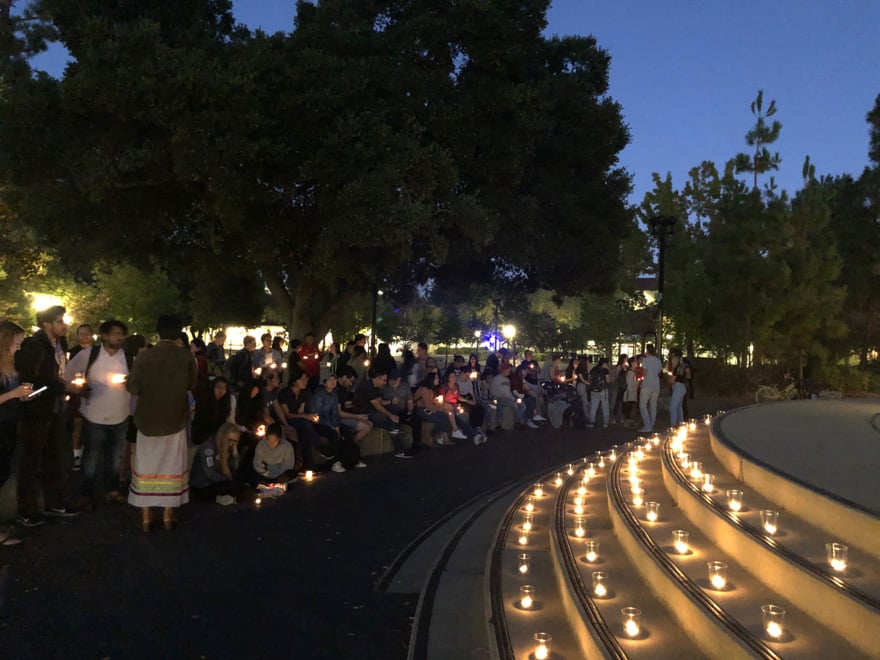On Monday evening, students joined the Stanford American Indian Organization (SAIO) and the Native American Cultural Center (NACC) in an Indigenous Peoples’ Day Vigil.
The event, aimed at spreading awareness of Indigenous history and culture, took place on the 30th anniversary of the establishment of the Muwekma-Tah-Ruk house at Stanford and the 50th anniversary of the occupation of Alcatraz by Native American activists.
It also coincided with what some celebrate as Indigenous Peoples’ Day and others celebrate as Columbus Day.
“Indigenous Peoples’ Day is a reimagining of Columbus Day,” said Karen Biestman, Associate Dean and Director of the NACC and a lecturer in the Native American Studies Department. “It’s an opportunity to reimagine Native excellence on campus.”
The event was held to celebrate Indigenous cultures and histories as well as to raise awareness on topics like land rights and diversity within Indigenous identity.
“This is Muwekma-Ohlone land we’re standing on right now,” said Aja Two Crows ’21, co-chair of SAIO, in reference to the Native American group that lived in the Bay Area prior to colonization. “We want people to acknowledge that this was our land, and it is still our land in different ways, including emotional and spiritual ways, and this event symbolizes that for so many people.”
She also emphasized the multifaceted nature of Indigenous Peoples’ Day.
“I think this day represents so much,” Two Crows said. “It’s difficult to put into words, because there’s so much pain and history, but it’s also a celebration of us and our resilience, how we are still here … [Columbus Day] represented, for me as a child, a lot of the hypocrisy in this country and its glorification of people who destroyed lives. Indigenous Peoples’ Day represents not only the plight but the resilience of Indigenous people in the U.S. and in the world.”
“We do not let days like what some people call Columbus Day — named for a man who set forth a tidal wave of destruction for our people — define us,” she added.
Recent campus developments, including the University’s decision to rename some (but not all) campus features that reference California mission system founder Junipero Serra, were mentioned at the Vigil, and a statement issued by Stanford’s Native American community praising the Serra decision was read by Carson Smith ’19, a chair of SAIO.
“We honor the decision to remove Father Junipero Serra’s name from select campus landmarks,” the text of the statement — which was already public — reads. “We especially honor the many voices of Stanford students, staff and faculty who engaged in thoughtful inquiry, compelling conversations and scholarly research to better understand the complex impact of the Serra name and legacy for over three years … Together, we are uniquely positioned to reimagine the landscape honoring Native American excellence.”
The 2018-2019 academic year is also the first one in which the Leland Stanford Junior University Marching Band mascot, the Tree, has been donned by someone of Native American identity: Dahkota Brown ’20.
“These are important moments in time to share and to celebrate,” Biestman said. “This is a really monumental year, and we’re really excited to be collaborating and to be using this as a moment to educate each other and to use this as a moment to heal.”
The Vigil also included artistic performances, including storytelling, music, dance and songwriting.
According to Two Crows, it was important that the Vigil be inclusive to all communities.
“We try to emphasize that this is an event for all people,” she said. “Despite all that has happened, we are still working tirelessly to promote indigeneity and indigenous rights and welfare throughout the country, and we also want to take this moment to show Stanford what it means to be indigenous.”
Biestman emphasized the importance of having such opportunities for Stanford students to learn from and about one another.
“One of my favorite quotes is an Apache translation: ‘Wisdom sits in places,’” she said. “These kinds of venues are opportunities to share our wisdom, to share our stories.”
The Stanford College Republicans, for their part, celebrated Columbus Day with a Facebook post commemorating the “Discovery of America and Italian heritage.”
Contact Karen Kurosawa at karen16 ‘at’ stanford.edu.
